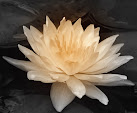May 22, 2010
"Beauty Is Truth. Truth, Beauty"
At another time I would have talked about the significance of simple things in William Carlos William’s focused descriptions or William Blake’s suggestion that eternity could be glimpsed through intense observation.
I might have even (and I’ll give you a bit more here) relayed Eric G. Wilson’s melancholy view in his book, Against Happiness, that his connectedness with “rhythms that drive” the earth and all life, “their sweet contracting and expanding,” “this unique and unrepeatable possibility” is beautiful not only because it is fleeting, but because of its authenticity.
And that comes closest so far to what I intend to develop.
May 17, 2010
Truth and Beauty
May 14, 2010
Behind It All
from "Auguries of Innocence" by William Blake
To see a World in a Grain of Sand
And a Heaven in a Wild Flower,
Hold Infinity in the palm of your hand,
And Eternity in an hour.
May 8, 2010
“Living, Loving Quietly”
Examine lyrics (easily located on the Web) from his Trouble album or from Till the Sun Turns Black to find a singular insight.
When I first read the title, “Till the Sun Turns Black,” I was turned off by its depressing idea, but the French horns coupled with his signature guitar grabbed me, and I was drawn into their soft lyrical simplicity.
I listened repeatedly. To the music. To the words. To the acoustic guitar with its constant assuring rhythm. To the strings and timpani building with the emotion and pain of his voice. To the horns as they enter and frame the last verses.
Then I wondered which verse was mine? Who was I in the song?
“young and pretty . . . blooming, laughing”
“old and lonely walking”
“corporate man winning”
“working classes trudging”
But it didn’t matter for the life activity of each would recycle “till the sun turns black.” Was my life like this? Too very often, yes. I prayed that I would no longer let it be.
I don’t believe we’re cast here to the earth in a cruel way – unable to be what we’re supposed to be – unable to function or experience the world – unable to make sense of it – unable to cope – unable to know – unable to be.
But so often my energy is focused on myself. What I’m doing, what I need, what I want. What I must accomplish. Do I notice who surrounds me, give them what they might need or want? I prayed that I would know how.
No matter whom we are, how different we are, what we have known in our lives, we all breathe the need for hope. Ironically, as the song ultimately suggests, it is the “wise man simply living, loving” that in my opinion can break the monotonous march to the end supplying in “every breath he takes, eternity.”
May 4, 2010
"To Meet the Night in Ways that Bring the Dawn"
This has been a most difficult post to complete.
Perhaps due to the number of quotations I could not bear to lose.
Or because it is based on one meaningful to me for most of my life.
Though it hasn't brought me or anyone I know out of difficult times, it reminds me how to keep from them.
“to meet the night in ways that bring the dawn”[1]
a book title
and poem
a poet reading from his work
sits among us sharing lines
composed for his individual students
their talents encouraged
personalities affirmed
and hardships acknowledged
“to meet the night in ways that bring the dawn”
when circumstances force
dark nights of the soul
I know morning follows evening
"but evil thought and deed
suffering so apparently growing
power subverting greater ideas and causes
turns me under like a wave—flipped
sand-stirred, churned in the break
without surface or boundary"[2]
“. . . it is necessary that [the soul] be placed in emptiness and poverty and desertion on all sides, and be left parched, void, and empty and in darkness.”[3]
to meet the night
do not be caught off guard
in ways that bring the dawn
be assured of its passing
persevere toward and welcome solution
“Moses drew near to the thick darkness
where God was.”[4]
[1] To Meet the Night in Ways that Bring the Dawn, Ross L. Mooney
[2] “Ignorance Is Not Innocence,” Jennifer Elliott Jackson
[3] The Dark Night of the Soul,
[4] Exodus







